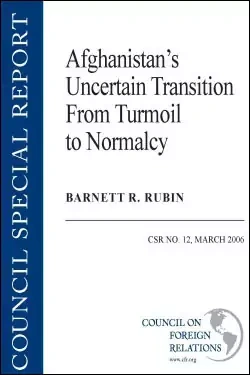
Afghanistan's Uncertain Transition from Turmoil to Normalcy

- Council Special Report
- Concise policy briefs that provide timely responses to developing crises or contributions to current policy dilemmas.
Overview
Afghanistan’s Uncertain Transition argues that Afghanistan is still far from stability.
While the country has reestablished basic institutions of government, it has barely started to make them work. The government and its international supporters are challenged by a terrorist insurgency that has become more lethal and effective and that has bases in Pakistan, a drug trade that dominates the economy and corrupts the state, and pervasive poverty and insecurity. The Afghanistan Compact, approved in January 31, 2006, provides a road map for security, governance, and development over the next five years. The United States should take the lead in ensuring full funding and implementation of the Afghanistan Compact, and develop a coherent strategy toward the Afghanistan-Pakistan relationship. This strategy would entail pushing the Pakistani government to arrest Taliban leaders whose locations are provided by intelligence agencies and taking aggressive measures to close down the networks supporting suicide bombers.
More on:
Download the Spanish language version of this report [PDF], translated by the Real Instituto Elcano.
More on:
 Online Store
Online Store